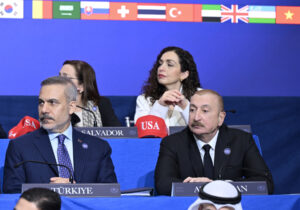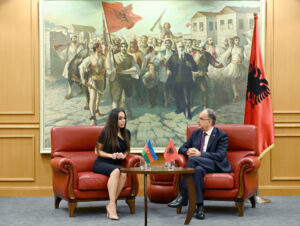Strengthening Regional Partnerships: A Joint Vision by Azerbaijan and Georgia

President Ilham Aliyev of the Republic of Azerbaijan and Prime Minister Irakli Kobakhidze of Georgia held press statements together on January 17, 2025, highlighted the strong partnership and high ambitions of the two nations. Here is my analysis that will cover areas discussed in the speeches during the press conference:
Historic Relationship
Opening the event, President Ilham Aliyev highlighted Azerbaijani and Georgian deep historical and cultural relations. The atmosphere — friendship, good neighborliness, and brotherhood — of which has existed for centuries between the two nations, he said. Prime Minister Kobakhidze also echoed the sentiments and said the partnership is founded on a ‘strong foundation’ of shared history and mutual respect. They established the tone for talking about contemporary collaborations and what they hope for in the future.
As his first foreign trip in the wake of Georgian parliamentary elections which were marred by allegations of rigging, Mr. Kobakhidze’s visit to Azerbaijan particularly carries symbolic value, President Ilham Aliyev said. Aliyev hailed the victory of the Georgian Dream party as vital to stability in the region and he expressed optimism about continued work with Kobakhidze.
Economic Collaboration and Investment
Azerbaijani investments in Georgia amount to $3.6 billion, President Aliyev said, evidencing confidence in Georgia’s favorable investment climate. Azerbaijan is one of Georgia’s top five trade partners, Prime Minister Kobakhidze said, emphasizing the high productivity of the 10th meeting of the joint intergovernmental commission on economic cooperation held earlier in the day. Their economic relationship is based on energy cooperation. Oil and gas exports of Azerbaijan — the main source of energy security for many countries including Georgia — are an important facet in the country’s export strategy, said Aliyev. This partnership shows the interdependence of their energy strategies: over 80% of Georgia’s natural gas consumption is supplied by Azerbaijan. They also discussed new green energy initiatives underway.
Connectivity: The Middle Corridor and Beyond
linking Asia and Europe via the South Caucasus—is the centre stage of the strategic connectivity projects, including ones such as the Middle Corridor. Both President Ilham Aliyev and Prime Minister Kobakhidze recognized their countries as bridges between continents. Both leaders stressed that infrastructure must be enhanced and logistics digitalized to maximize potential of these projects. But these initiatives also define Azerbaijan and Georgia as vital players in global trade networks, and strengthen bilateral ties.
Regional Stability
Peace and stability in the South Caucasus remain priorities for both nations. Prime Minister Kobakhidze emphasized the need for coordinated efforts to address regional challenges, reaffirming Georgia’s support for Azerbaijan’s territorial integrity and sovereignty. Both leaders expressed their shared vision of a secure and prosperous region, rooted in mutual respect and strategic partnership.
Both nations focus peace and stability in the South Caucasus as their priorities. Prime Minister Kobakhidze emphasized need for concerted efforts to tackle regional issues, pledged Georgia’s backing for Azerbaijan’s territorial and sovereignty without exception and assured that Baku is among one of Georgia’s priority partners. Both leaders shared the idea of a secure and prosperous region inseparably based on mutual respect and strategic partnership.
Looking Ahead
The leaders then said they will seek to deepen political, economic, and cultural ties. President Aliyev was invited to visit Georgia as a symbol of the boundless bonhomie between the two countries, Kobakhidze said.
Conclusion
Azerbaijan’s vigorous relationship with Georgia is amply evidenced in the press conference of January 17. While the two seem to be diverging with their foreign and domestic policies, they share initiatives that work for the promotion of energy, connectivity and regional stability and continue rejecting the perception of peace as a zero-sum game. It also helps with regional and global stability, and benefits the peoples both for it.


